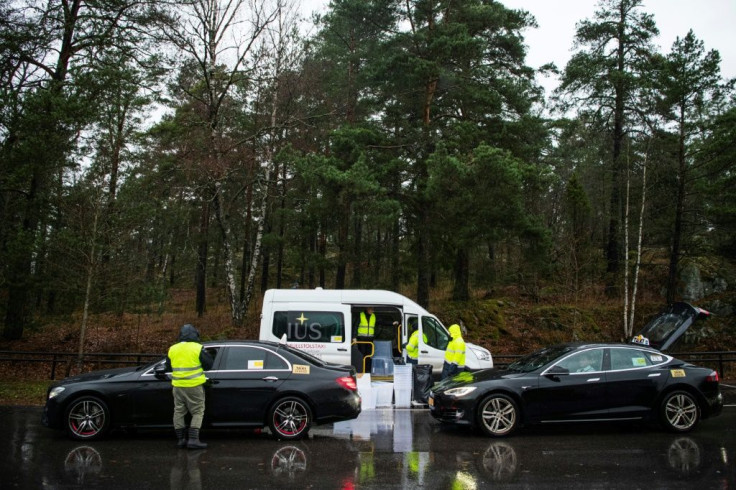Sweden's Taxi Drivers Help Step Up Covid Testing
As the Covid-19 pandemic worsened and her business ferrying Stockholmers around the city dried up, Swedish taxi driver Jotta Nikopoulou found new work with her cab: delivering tests to the sick.
The 45-year-old now reports daily to a station on Stockholm's outskirts where she collects a box containing a PCR test which she delivers to the door of someone with symptoms, returning 15 minutes later to collect it for processing.
It's part of a programme Stockholm authorities launched in June to boost testing capacities as the country struggled to contain the virus.
Drivers from two firms deliver around 25,000 tests a week in the Stockholm region, according to Karolinska University Hospital, which is involved in testing in the area.
Some 45,000-52,000 PCR tests are currently taking place in the capital per week.
Nikopoulou is one of some 1,150 drivers from her company to volunteer for the work.
"In the beginning I was a little bit skeptical about it, but we did a course in how to do this, so we follow all the routines and keep our distance," she said, taking a break behind the wheel of her black Volvo estate parked by the tent where drivers collect test kits under a grey, winter sky.
Pulling away, Nikopoulou queued up to pick up a test and an address to deliver it to.
A short drive away, she pulled up outside an apartment, knocking and stepping well back as the patient collected the package.

Nikopoulou doesn't wear a face mask, as Sweden does not require their use, but she does don gloves and washes with hand sanitizer before and after each delivery. She also wipes down the parts of the car she has touched.
She made several more deliveries in the area before returning to collect the sample to deliver it for testing.
Drivers from her company make up to six deliveries each per day.
Nikopoulou has worked as a driver for 11 years and while Sweden is known for its softer approach to the coronavirus pandemic, never locking down to the same extent as other countries, she noticed a marked change in the spring.
"Nobody wanted to go to the office, nobody wanted to go to the airports, so we had nothing (to do)," she said.
The programme was conceived to help boost the region's test capacity.
It also "minimises the risk of spread of the disease during the testing process" by allowing the sick to test themselves at home, according to Karolinska University Hospital.
Since taking a training session before she started, Nikopoulou says she has not worried about the work, keeping her distance and washing her hands regularly.
With almost 300,000 cases and 7,200 deaths in the country of 10.3 million -- much higher than its Nordic neighbours -- Nikopoulou said she was happy to help.
"I am doing something in this pandemic," she said.
© Copyright AFP 2024. All rights reserved.





















